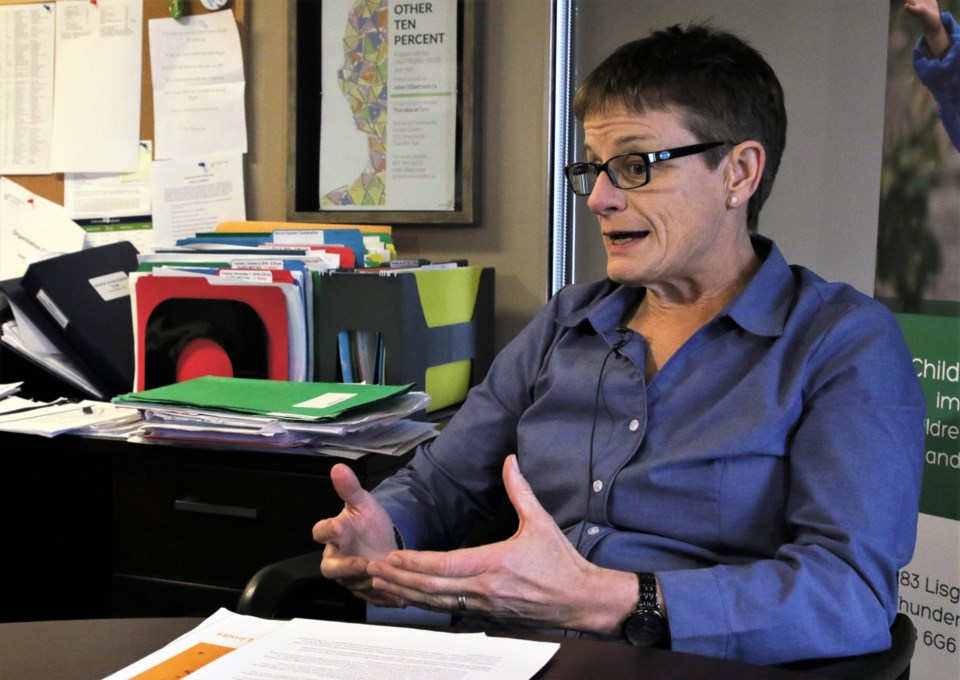THUNDER BAY – A children’s mental health agency is raising alarm bells over the continued closure of schools in Northwestern Ontario, calling on the province to turn to a regional approach, to recognize lower COVID-19 case counts and other indicators in the area.
In a letter addressed to Premier Doug Ford, the Children’s Centre Thunder Bay (CCTB) said the harms from closing schools outweigh the public health risks now that the region’s case numbers have fallen to double digits.
CEO Diane Walker urged the province to prioritize vaccines for education workers, as well as allowing a regional approach.
“We are losing the mental health struggle, families are falling apart, and those most marginalized are simply disappearing into the shadows where we can no longer connect with them,” she writes.
Students in Thunder Bay have been engaged in virtual learning for two-thirds of their educational time over the past year, she calculated.
That’s had a devastating impact for many children and families, she said, pointing to the results of a survey of the non-profit agency’s clinicians.
Of 443 open cases, CCTB staff said 72 per cent are “experiencing substantial difficulties related to school closures.”
The survey found 65 per cent of those clients are experiencing more mental health difficulties and 57 per cent are experiencing increased behaviour problems, while 70 per cent of parents are experiencing significant distress trying to work and support virtual learning from home, and 45 per cent could no longer work due to school closures.
“I knew eating disorders, suicidality, and depression were escalating,” Walker said. “I thought, somebody has to talk about this. My fear is that in 10 years, there will be this missing cohort of children that normally would have been supported and helped because they were in school.”
Perhaps most worrying for Walker is the number of children considered “high-risk” with whom CCTB school counsellors have completely lost contact. She reports 66 children who had been receiving those services are no longer in contact.
“Even with relentless effort on their part to connect with those kids, they can’t connect with them,” she said. “They aren’t showing up at school, they’re not connecting back.”
“My thought is if in this small town of 100,000 people we’ve lost 50 or 60 kids completely, imagine what that looks like across the province. We’re talking thousands and thousands of kids that might have been doing okay that are falling off the radar.”
The situation speaks to the crucial role of school in providing structure, supports, and social connections for children, she said, calling schools one of the building blocks for children’s mental health.
“At-risk kids really rely on schools to have a better trajectory, and that’s been stripped away with school closures,” she said. “With that gone, a lot of those kids – particularly kids that are on the margins or are struggling – can become lost, hopeless, or discouraged… Some are becoming suicidal, they disappear and our social workers can’t track them down.”
With the letter, which is addressed to Education Minister Stephen Lecce and chief medical officer of health Dr. David Williams, Walker hopes to amplify the conversation around the impacts of the pandemic on children’s mental health.
“We must work to balance the threats to people’s physical health with the impact on children’s mental health,” it reads. “We must balance today’s needs with the future consequences that are looming just over the horizon.”
The full text of the letter can be read at CCTB’s Facebook page.
The document specifically calls for a return to a regional approach to school closures – a strategy supported by local MPPs.
It also calls on the province to accelerate vaccination for education workers to support school reopening – a strategy teachers’ unions have urged, but seemingly with little success.
While skeptical of school closures in general, she acknowledges there was a strong case for the strategy in February, when local medical officer of health Dr. Janet DeMille recommended schools in the Thunder Bay area close.
“Fair enough, we had a lot of cases and lot of people in hospital,” she wrote in the letter. “But now, that’s not the case. It kind of seems that if Southern Ontario has a problem we all suffer, but if we in the North have a problem the regional approach is good to go.”
Active cases in the Thunder Bay District Health Unit have fallen from a high of 470 on March 7 to 56 as of Saturday.
“Do I think we have to support Toronto [by opening] our hospital to patients? Absolutely. Southern Ontario helps us all the time, and we have to do that back,” she said. “But I don’t see the point in closing [schools here].
Adding to her frustration is the seeming inconsistency of provincial measures.
“If you look at some of the data, planes and factories are causing a lot more [cases] than schools ever did,” she said. “I think they’re trying to solve a problem with a shotgun approach, and it’s completely unnecessary.”
While school spread may have been minimal, shuttering schools has such negative impacts that education workers should be prioritized for vaccination for reasons beyond health risks, she argues.
“Our children are the ones at risk and we need to do whatever needs to be done to open schools safely,” she said. “[We need] a solution that includes prioritizing school personnel – so they can show up wholeheartedly in their work and for our kids.”
